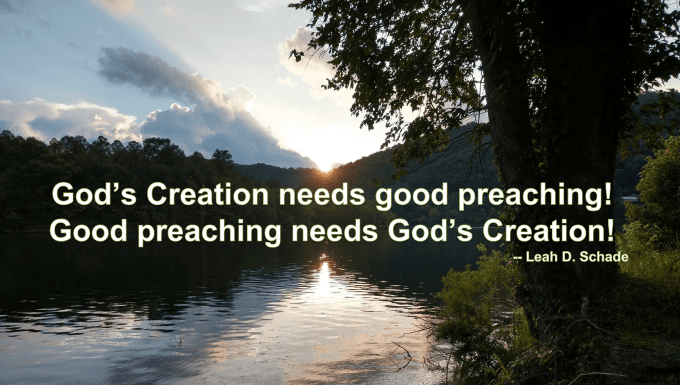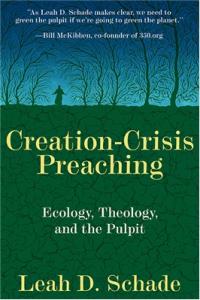If you want to craft eco-sermons to be part of protecting and healing God’s Creation, here are 10 Principles for Environmental Preaching.

Becoming an “EcoPreacher”
I first began my work as an “EcoPreacher” nearly twenty years ago when I started an eco-ministry in the Lutheran church I served just outside of Philadelphia, Pennsylvania. I believed it was important for people to connect their faith with the climate and environmental justice issues that are affecting our world and local communities.
One Sunday I was invited to preach an Earth Day sermon for a neighboring church and focused on the need to preserve natural lands. I highlighted a beautiful local land trust as an example of human beings obeying the command of God in the Garden of Eden: this far and no farther. At the end of the sermon, I said this:
Sometimes there is great blessing in establishing boundaries and protecting them. Sometimes the benefits of changing your lifestyle or business practices to reduce your carbon footprint outweigh the initial sacrifice. And sometimes foregoing profit in order to preserve a natural legacy reaps rewards far beyond monetary wealth. Acknowledging a dying Earth is the only way to save it. Because after coming through the scorched land of eco-crucifixion, God will bring us to the eco-resurrection in the new Eden – the garden of Easter morning.
Many congregants expressed curiosity about the nature preserve and indicated their intention to explore it. But the most moving comment came from a gentleman who shared that he and his family had a piece of property inherited from his parents, and they were debating what to do with it. He said that after hearing the sermon, he would suggest to his family that they turn it into a land trust to preserve it for posterity. He thanked me for planting the seed in his mind.
That experience taught me something that has stayed with me for twenty years.
God’s Creation needs good preaching, and good preaching needs God’s Creation.

I believe that when preachers make a regular practice of connecting Scripture and environmental issues, we can proclaim justice for God’s Creation in the face of climate change and environmental devastation. Studies have shown that parishioners who hear sermons about climate change are more likely to want to take steps to prepare and protect communities than those who hear nothing from the pulpit about this issue.[1]
Yet, my own research has shown that many clergy are hesitant to address climate and other environmental issues.
In a 2017 survey of over 1,000 U.S. mainline Protestant clergy, I gave respondents a list of social issues and asked which ones they had addressed in the previous year. Environmental issues registered among the lowest priorities to address. Mostly, this is due to fear of getting pushback from parishioners who think these issues are “too political.”
Fortunately, the 2021 survey saw environmental issues rise to be in the top ten. [Read: Clergy Report Preaching More about Climate Change: National Survey] However, the survey still showed that less than half (47%) of the respondents had addressed things like pollution, extinction, climate change, or environmental justice in their sermons.
Concern about climate change
Yet, according to research by ecoAmerica in 2021, 78% of Americans are concerned about climate change.[2] In a similar finding, I recently conducted a study through the BTS Center surveying 172 congregational lay leaders representing more than ten different denominations from thirty congregations across sixteen states in the U.S. 75% of those congregational leaders indicated they were “very concerned” about the environment and climate change.[3]
Unfortunately, a 2022 report by the Pew Research Center indicated that 70% of Americans say they’re not hearing about climate change in sermons.[4] Without the biblical, theological, and ethical framing of climate and environmental issues for parishioners, how can churches be expected to take action to help protect God’s Creation?
Do you want to be an “EcoPreacher”?
If you’re a preacher wanting to craft sermons that make the biblical and theological case for protecting God’s Creation, here are 10 principles for environmental preaching. These will help you read and interpret Scripture in order to preach an “eco sermon.”
10 Principles for Environmental Preaching
Guiding Ecojustice Principles
These first six principles are drawn from Norman Habel’s work in The Earth Bible series.[5]
- The principle of intrinsic worth. The universe, Earth and all its components have intrinsic worth/value.
- The principle of interconnectedness. Earth is a community of interconnected living things that are mutually dependent on each other for life and survival.
- The principle of voice. Earth is a subject capable of raising its voice in celebration and against injustice.
- The principle of purpose. The universe, Earth, and all its components are part of a dynamic cosmic design within which each piece has a place in the overall goal of that design.
- The principle of mutual custodianship. Earth is a balanced and diverse domain where responsible custodians can function as partners with, rather than rulers over, Earth to sustain its balance and a diverse Earth community.
- The principle of resistance. Earth and its components not only suffer from human injustices but actively resist them in the struggle for justice.
Principles of an Ecofeminist Lens for Preaching

The last four principles are ones I have developed using an ecofeminist lens* in my book Creation-Crisis Preaching: Ecology, Theology, and the Pulpit.[6]
- Focus on Earth-orientation rather than focusing strictly on humans, and particularly male humans. Read Scripture through a “green lens” to ascertain how texts may be oppressive or liberating to women, children, those most vulnerable, and the Earth community.
- Proclaim the good news for both the human and other-than-human community of Earth. Analyze the impact and power that certain texts will have when preached in a community of faith within its ecological context.
- Practice a hermeneutic of remembrance. Recover biblical traditions so that we can view the biblical story from an ecofeminist perspective, moving away from the inherent human-centeredness and male-centeredness of texts that assume subordination of Earth and women.
- Engage creative actualization. Tell stories from Earth’s and women’s perspectives. Reformulate narratives lifting up the discipleship of equals among human communities and with our Earth kin.
To see examples of how these principles can be used in actual sermons, here are links to sermons here on my blog, EcoPreacher on Patheos:
Resurrection Sermon for an Earth-kin Congregation
Noah’s Ark and Climate Change: What Kind of Church Will We Be?
Also, see the sermons in my book, Creation-Crisis Preaching.
Putting the 10 Principles for Environmental Preaching to work: EcoPreacher 1-2-3
In an effort to encourage clergy to preach and teach on Christian ecology at least once a month, the Interfaith Center for Sustainable Development and I have partnered to develop a free resource called EcoPreacher 1-2-3. We provide sermon preparation for preaching about caring for God’s Creation and environmental justice that is short, accessible, and based on a solid biblical foundation.

Each installment of EcoPreacher 1-2-3 offers a brief “eco-exegesis” for interpreting a biblical text from the Revised Common Lectionary. This is followed by one “eco idea” for the basis of a sermon, two “eco questions” to go deeper, and three “eco actions” to help a congregation put their faith into action. With this resource, preachers can use the sermon ideas in their own context and make it relevant for their congregation.
EcoPreacher 1-2-3 is ecumenical, adaptable to your preaching context, and can spark ideas for sermon preparation and teaching. Sign up to receive the monthly EcoPreacher 1-2-3 resources at https://interfaithsustain.com/ecopreacher-123/.
I also publish each edition of EcoPreacher 1-2-3 on my blog. Here are a few examples:
Ash Wednesday and Lent: Fasting for Earth as Resistance to Oppression
Be Persistent! Wrestling a Blessing for Eco-Justice: Genesis 32, Luke 18
God’s Creation PREACHES! Psalm 19 Links Nature and Torah
In the face of eco-crucifixion, preach eco-resurrection
Remember that when preaching about God’s Creation, many will feel dismay because we are in the midst of what I call an “eco-crucifixion.” So one of the most effective strategies for eco-preaching is to share stories of people of faith and worshiping communities working to protect, heal, and restore Earth and communities damaged by environmental injustice. Show people how they can participate in God’s redemption of Creation not with wishful thinking, but with authentic hope in God’s “eco-resurrection.” This is the power of good preaching, and it is the power of God in and through Creation.
* Ecofeminists see a connection between the oppression of Earth and the oppression of women and those most vulnerable. They believe that the ecological crises cannot be addressed without simultaneously addressing patriarchal, hierarchical domination systems. Ecofeminists make a concerted effort to show how ecological issues are directly tied to issues of justice for women, the poor, people of color, Indigenous communities, and all marginalized and vulnerable individuals and groups.
Read also:
How to Preach a Sermon about Climate Change and Your Congregation
Blessing Animals Sunday: Genesis 2:18-24 Sermon Ideas
ECO-WEDDING LITURGY: Ideas for a Creation-Centered Wedding
Churches Can Connect Faith and Creation Care for Lent

The Rev. Dr. Leah D. Schade is the Associate Professor of Preaching and Worship at Lexington Theological Seminary in Kentucky and ordained in the ELCA. Dr. Schade does not speak for LTS or the ELCA; her opinions are her own. She is the author of Preaching in the Purple Zone: Ministry in the Red-Blue Divide (Rowman & Littlefield, 2019) and Creation-Crisis Preaching: Ecology, Theology, and the Pulpit (Chalice Press, 2015). She is the co-editor of Rooted and Rising: Voices of Courage in a Time of Climate Crisis (Rowman & Littlefield, 2019). Her newest book is Introduction to Preaching: Scripture, Theology, and Sermon Preparation, co-authored with Jerry L. Sumney and Emily Askew (Rowman & Littlefield, 2023).
[1] Robert P. Jones, Daniel Cox, Juhem Navarro-Rivera, Believers, Sympathizers, and Skeptics: Why Americans are Conflicted About Climate Change, Environmental Policy, and Science: Findings from the PRRI/AAR Religion, Values, and Climate Change Survey, (Washington, D.C.: Public Religion Research Institute and American Academy of Religion, 2014).
[2] American Climate Perspectives Survey 2021, Vol. IV. ecoAmerica. https://ecoamerica.org/american-climate-perspectives-survey-2021-vol-iv/
[3] Schade, Leah D., “EcoPreacher Congregational Leader Survey,” 2022, BTS Center, unpublished survey results.
[4] Alper, Becka A., “How Religion Intersects with Americans’ Views on the Environment,” Pew Research Center, Nov. 17, 2022. https://www.pewresearch.org/religion/2022/11/17/how-religion-intersects-with-americans-views-on-the-environment/
[5] Norman C. Habel, “Guiding Ecojustice Principles,” in Readings from the Perspective of Earth, ed. Norman C. Habel, The Earth Bible (Cleveland: Pilgrim Press, 2000), 2.
[6] Leah D. Schade, Creation-Crisis Preaching: Ecology, Theology, and the Pulpit, St. Louis, MO: Chalice.













